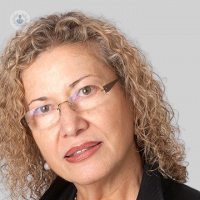PCOS explained: who is affected by polycystic ovary syndrome?
Written by:Polycystic ovary syndrome can cause cysts to grow on the ovaries, but they usually cause no harm. However, they lead to an imbalance in hormones, which can affect patients in different ways. Professor Gordana Prelevic, leading endocrinologist and specialist in PCOS, explains more about the condition and how its effects can be combatted.

What is polycystic ovary syndrome and who does it affect?
Polycystic ovary syndrome, often called PCOS is the commonest disorder in women of reproductive age. It is in fact a heterogeneous disorder and different women present with different dominant clinical features and hormonal abnormalities. Polycystic ovaries in ultrasound are found relatively frequently, and may be seen in 20 to 25 per cent of women of reproductive age. Only a proportion of them indeed have polycystic ovary syndrome and doctors think that prevalence of PCOS is between eight and 10 per cent.
What is the difference between having polycystic ovaries and polycystic ovary syndrome?
In order to qualify for the diagnosis of polycystic ovary syndrome, in addition to polycystic ovaries showing on an ultrasound scan, the individual must display any of the clinical features or any of the hormonal abnormalities which are characteristics of PCOS.
What are the symptoms of PCOS?
The most common symptoms of polycystic ovary syndrome are menstrual cycle irregularities, signs of hyperandrogenism (unwanted hair growth, acne, and scalp hair loss), and obesity, which is present in a significant proportion of women. As for menstrual cycle irregularity, the vast proportion (about 70%) would have oligomenorrhea, which means periods are at two, three, or four-month intervals. Around 20% would display a complete lack of periods which is referred to as amenorrhoea, and the rest would have either regular periods or more frequent bleeding.
As for hirsutism, or unwanted hair growth, which could be a cause for significant problems in young women, it could be of varying degree. Fortunately, in the vast majority of women, hirsutism is very mild but in a proportion of women, it could be quite severe.
What is the treatment for polycystic ovary syndrome?
The treatment of polycystic ovary syndrome is symptomatic. In other words, we cannot offer treatment which would cure the problem, but we can offer various treatments depending on what is the focus of that particular patient’s attention whether it is irregular periods or unwanted hair growth or infertility.
Therefore, if the patient is a young woman with irregular periods or a lack of periods, we could provide treatment with either cyclical progesterone or the contraceptive pill. If the main focus of clinical attention is unwanted hair growth and hirsutism, we treat that with a combination of contraceptive pill and anti-androgens. If fertility is the issue, then there is an array of treatments available, ranging from tablets to injections - and this is usually done by a fertility specialist.
If you would like to book an appointment with Professor Gordana Prelevic today, head on over to her Top Doctors profile today.


